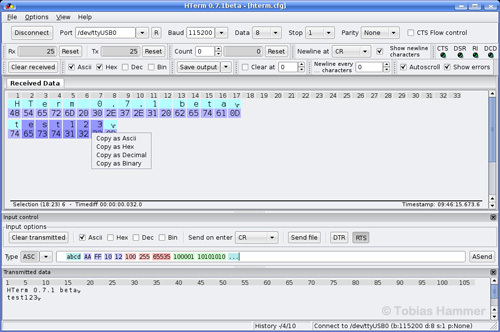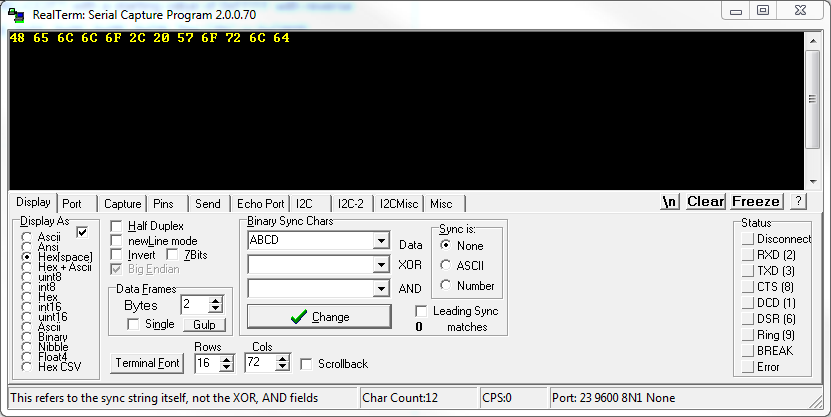
- LINUX SEND BINARY DATA TO SERIAL PORT HOW TO
- LINUX SEND BINARY DATA TO SERIAL PORT PORTABLE
- LINUX SEND BINARY DATA TO SERIAL PORT SOFTWARE
- LINUX SEND BINARY DATA TO SERIAL PORT CODE
LINUX SEND BINARY DATA TO SERIAL PORT CODE
with open("myfile", "rb") as f:įrom now on thanks to := operator the above code can be written in a shorter way. It would also save you from changing the condition if you go from byte mode to text or the reverse. This makes the code compatible between 2.6 and 3.x without any changes. Or as benhoyt says, skip the not equal and take advantage of the fact that b"" evaluates to false. We will no longer get raw characters from the stream in byte mode but byte objects, thus we need to alter the condition: with open("myfile", "rb") as f: To use it in v 2.5 you'll need to import it: from _future_ import with_statement Note that the with statement is not available in versions of Python below 2.5. Python 2.4 and Earlier f = open("myfile", "rb") TCSANOW specifies all option changes to occur immediately Tcsetattr(fd, TCSANOW, &options) //set the new options. Options.c_cc = 0 // Wait x * 0.1s for input (unblocks!)

Options.c_cc = 0 // Wait until x bytes read (blocks!) In some cases, the serial port is used to transfer binary data. These key sequences can still be used on Linux terminals to pause and resume the terminal. Options.c_oflag |= OPOST // ? choosing processed output Linux Send Binary Data To Serial Port The characters used are XON/XOFF XOFF corresponds to the Ctrl-S character and XON corresponds to the Ctrl-Q character.
LINUX SEND BINARY DATA TO SERIAL PORT SOFTWARE
Options.c_iflag &= ~(IXON | IXOFF | IXANY) // disable software flow control Options.c_iflag &= ~INPCK // disable parity check Options.c_lflag &= ~(ICANON | ECHO | ECHOE | ISIG) // choosing raw input Options.c_cflag |= CS8 /* select 8 data bits */ options.c_cflag &= ~CSIZE /* mask the character size bits */ Options.c_cflag |= (CLOCAL | CREAD) // ? enable receicer and set local mode

Tcgetattr(fd, &options) //this gets the current options set for the portĬfsetispeed(&options, B9600) //input baudrateĬfsetospeed(&options, B9600) // output baudrate Perror("open_port: Unable to open /dev/ttyS0 - ") Sending binary data over a serial connection with pyserial Something like port.write (struct.pack (' Perhaps I need to use fread for that too? I tried, but I cannot figure out how to implement it for a serial port as I am relatively new to programming. I have a hunch that the problem in my code lies in the second program. The second program creates a file called "testout.jpg", and is supposed to read in the data sent from the previous program. It then closes the file, and is supposed to send that file over a serial port. The first program opens a file "test.jpg", reads it in binary mode and stores the result in a buffer. Please note, I asked a question similar to this earlier when I was at a different stage of this project.īelow are programs. I need help reading and writing binary data over a serial port, and would appreciate any advice you may have. This demo program opens and initializes a serial terminal at 115200 baud for non-canonical mode that is as portable as possible.So I searched around, and couldn't exactly find what I needed. Linux Send Binary Data To Serial Port It displays how to set and go through serial interface settings, and how to send out and receive information on a serial interface. It’s essentially derived from the other answer, but inaccurate and misleading comments have been corrected. This code should execute correctly using Linux on x86 as well as ARM (or even CRIS) processors. For most applications, it can be omitted. CMSPAR is needed only for choosing mark and space parity, which is uncommon. Setting no blocking means that a read () returns however many characters are available without waiting for more, up to the buffer limit. I know the baud rate and parity information, but it seems like there is no standard for this? Do you need cmspar to read from serial port? I thought itd be simple to open and read/write from it in C. When I plug it in, it creates: /dev/ttyUSB1. I have a USB device in Linux that uses the FTDI USB serial device converter driver. How to open, read and write from serial port in C?LINUX SEND BINARY DATA TO SERIAL PORT HOW TO

LINUX SEND BINARY DATA TO SERIAL PORT PORTABLE



 0 kommentar(er)
0 kommentar(er)
